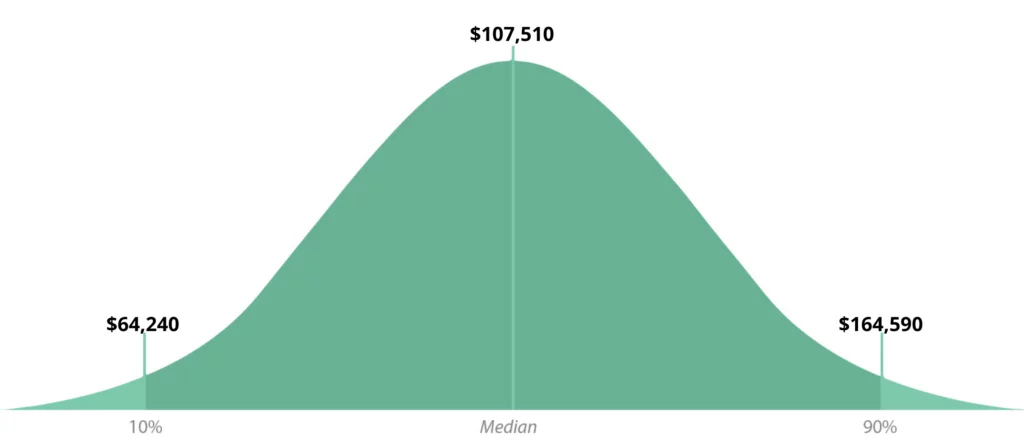
1. Overview: Job Responsibilities, Salary, and Common Requirements
2. A Comprehensive Guide to Becoming a Software Developer
3. What Does a Software Developer Do?
4. Signs You Should Consider Becoming a Software Developer
5. How Do You Become a Software Developer?
6. What are the Knowledge and Skills Needed to be a Software Developer?
7. Popular Schools and Colleges in the U.S. for Aspiring Software Developer
8. How to Get a Job as a Software Developer
9. Where to Get a Job as a Software Developer
10. Learn About Geographic and Location Pay Differentials
The median wage of a software developer in 2019 is $107,510 . The lowest-paid 10 percent is less than $64,240, and the best-paid 10 percent is more than $164,590.

Web Designer
Game Developer
Photographer
Video Editor
Animator
Graphic Designer
Print Designer
Linux Admin
Ruby on Rails
HTML
CSS
JavaScript
Java
SQL
Python
Linux
MySQL
C#
The computer is one of the greatest innovations widely used today. With its many software and applications, it’s basically essential in human life.
For example, you have the alarm clock application on your phone to help you wake up every morning. You also have the social media application to keep you updated with what’s happening around you, your family, and your friends.
You even have search engines that you can use for research, online shopping, or entertainment – and the software developer contributed to the creation of all these. Simply turning your computer on for work and using your email to send important messages are made possible with a software developer.
Software developers are part of the masterminds that develop new technologies. Without their creative minds and technical skills, we wouldn’t have these advanced computer programs, web, CRM software, and mobile applications that we use to fulfill day-to-day tasks.
Software developers are deeply involved in creating and designing new system software – from the initial planning stage to writing codes using programming languages and then testing to ensure quality. They also have the responsibility to maintain the new system software and make sure that it is functioning correctly and efficiently.
Software developers work with different platforms such as desktop computers, mobile phones, and the Internet.
Successful software developers usually share common traits. If these apply to you, chances are, you could be one too.
This is a must-have for every software developer. If you get excited every time a new game, gadget, or program is about to be released in the market, then a career in the technology field is perfect for you.
Software developers are always using cutting-edge technology, so you might not have to wait so long or spend huge amounts of money to experience the newest technology, depending on your job. You will have a chance to experience it firsthand when you work as a software developer.
Software developers sometimes work alone to focus on their part for their project, but most of the time, they work in a team, collaborating and solving problems hand in hand to meet a common goal. It takes a team who can work seamlessly together to come up with an innovative product.
Software developers don’t just memorize syntax and functions for coding – their work is also about solving problems and using the programming languages and tools available to help solve those problems.
Do you get annoyed when your room is untidy? Do you like naming your computer files according to a particular sequence? If your answer is yes, then software development might be for you. Software developers thoroughly prepare plans and requirements and design codes in a sequential phase.
5. You are not afraid to try new things.
Technology is constantly changing, and software developers should be able to adapt to these changes. They should also be able to come up with and meld into new ways of solving problems.
Do you enjoy solving puzzles and logically putting pieces together? How about solving the Rubik’s cube? Software development is like solving a giant puzzle. Developers use different codes and put them together to develop strategic solutions that enable them to create a new program or even solve a problem from an old program.

Becoming a software developer is not just for anyone. It requires clear direction, immense dedication, and continuous learning. Even an experienced software developer stumbles upon new things as technology is always changing. You should have the ability to be self-taught as you need to apply and master all the skills you have learned for you to become the best in your field.
Here is the usual path of a software developer to employment:
Employers usually prefer candidates who have completed a degree in software development in USA. Some colleges offer this as a major, however, you may also enroll in a bachelor’s degree majoring in computer science, software engineer, or any related field. This will give you an idea of software design, while also exposing you to curriculum that will help develop a comprehensive understanding of software architecture, programming, and testing.
This is a 6- to 36-week intensive technical training program that enables participants to learn the most important portions of coding and apply those skills to build an application at a professional level. The goal is to help them transition to a career in software development and increase their chances of landing a job. Participants expand their skills and increase their overall value by joining bootcamps.
A software developer internship helps aspiring students see what it’s like in the real industry. You will be taught and guided by the professionals, allowing you to gain valuable experience and skills along the way. An internship in software developing will open many doors for you as you might also have the chance to work with a potential client or employer. An internship will definitely make your application stand out.
Choosing a specialization will not limit your options. Instead, it will help you capitalize on the specific specialization you have chosen by making you a stronger fit. Developing and strengthening your skills in a particular area makes you stand out among your competitors.
Overall, there are two specializations in software developing:
However, there are other practices that are distinctive within the two software developer specializations mentioned above. Here are some specializations that you may choose from:
Web development is also known as website development. A web developer develops websites for hosting via the Internet (World Wide Web) or for an intranet (a private network).
Front-end developers use HTML, CSS, and JavaScript to build the visible parts of the website that help the user to interact with it. They manage what the user sees first in the browser, ensuring flawless user experience.
Back-end developers on the other hand, focus on how the site works. They use programming languages such as Python, PHP, and Ruby to develop or maintain the core functionality of a software application.
Full-stack developers are web developers that have both front-end and back-end skills. They use front-end languages such as CSS, HTML, JavaScript, and back-end languages such as Python, Python, PHP, and Ruby on Rails.
Desktop developers work with a desktop or a laptop computer. They improve the performance and add more power to a desktop application by upgrading the interface of the web application.
Mobile developers focus on creating software or systems for mobile devices like Android and iOS. The programming languages they commonly use to create web and mobile applications are Java for mobile, HTML5 and C# for Windows Phone, then Corona, Java, QML, Python, PHP for others.
Game developers design, create, and develop video games for computers, mobile devices, and programming consoles. They are proficient in programming languages such as C++ or Java.
Security developers are responsible for the creation of security software and the integration of this software into applications during design and development. They also resolve security issues by analyzing the software design and implementation, overall maintaining its security.
A WordPress developer is responsible for customizing websites according to the client’s preference. They make custom templates, modules, and plugins for WordPress and use programming languages such as HTML, CSS, JavaScript/jQuery frontend functionality, PHP, MySQL database, Terminal or Command Prompt or Powershell, GIT, and Grunt or Gulp.
If you want that extra edge to your application and a higher chance of bagging the position you’ve always wanted, attaining a software developer certification is a good idea. A certification can help boost your career, especially when you’re just applying for an entry-level position.
However, there are arguments if a software developer certification is really important, given that some companies are neutral about it while some companies insist on having one. Nonetheless, getting a certification on the specialization that you’ve chosen will still help you stand out in the job market.
After taking your bootcamp or completing your formal education in computer science, software engineering, or any related field, the next step is finding an entry-level employment. Employers usually ask for your specialization or the field you want to be focusing on. Tasks also vary depending on your specialization.
When searching for your potential job, make sure that you are familiar with the different titles and terms the employer is using to describe a position. It’s also much easier to find an open job post when you know what you’re looking for. Job title examples include software application integrator, applications support engineer and senior user experience designer.
One of the best avenues to stay up-to-date with the latest technology and development in your specialization is by attending conferences. This is also a chance to build your network, meet new friends, share ideas and experiences, and learn from other professionals in your field. If you’re lucky, you might even get a chance to collaborate with other software developers.
Software engineers are expected to have the right set of skills and ample knowledge to keep up with the world’s fast-growing interest and progression of technological innovations.
These are personality traits that help you work efficiently with software developers and non-software developers, like your vendors and clients. These include:
This is a skill every software developer should learn because programming is complex work. You need to get everything right to get the codes to run properly, so attention to detail is imperative in many aspects of software developing.
Sometimes, software projects are a tedious process and may take time to write correctly. Having a high amount of patience will help you become less frustrated when the codes don’t work after several changes. Not all developers get it right the first few times and accepting the fact that this happens will make you feel less overwhelmed. Learning how to manage your frustration while coding can help you become a better software developer.
A software developer should know how to properly communicate. Most of the time, miscommunication between team members is the culprit of failure in software. Developing your communication skills can help you express your thoughts and ideas clearly to avoid these misunderstandings.
Creativity is a strong fuel for innovation and self-improvement. Honing this skill will not only make you stand out among the others but also give you new ideas, possibly leading you create a new software solution that has never been created before. Being a creative thinker helps you stay inspired and at the top of your game.
This skill is the result of being creative. When you are a problem-solver, you can grasp and understand complex issues more easily and find solutions by being resourceful and making use of the knowledge and tools you already have.
You should have the ability to work well in a team because most developers work hand in hand with each other when coding, testing, etc. Companies look for this trait in their employees because a team player makes their organization more efficient and overall better.
Software developers also require technical skills and knowledge depending on their specialization. Here are the core skills you should focus on if you want to become a good software developer.
This is one of the fundamentals of software developing. It is the process of creating a computer program that can perform a specific task by developing and executing different instructions to the computer called source code or in other words, a programming language.
This is by being keen in the process of developing, creating, setting up, and maintaining software in a planned and structured process.
This is the process of finding bugs or errors in a program through testing, and then fixing the bugs found during the testing process by debugging.
This is the process of transforming a client’s request or requirements into a form suitable for using a programming language, which will help a programmer complete their software coding.
This is the process of systematically tracking, organizing, managing, and controlling alterations in the software’s codes and documents during Software Development Life Cycle.
Data Structure is the process of collecting data and organizing them so that different operations can be completed easily.
An algorithm is the process of designing a solution using a step-by-step procedure or set of instructions written in order, to be executed to get the desired output.
If you come up with a good data structure, you will also come up with a good algorithm, allowing you to manipulate data efficiently.
You should be able to conclude the needs and expectations of a software user from the software product by listing enough information about the requirements for project development.
Companies usually look for candidates with strong programming skills over traditional education. The toughest part is deciding which programming languages you should focus on since there are thousands to choose from.
Here is a list of the most commonly used programming languages of software developers:
This is probably the fastest-growing programming language in the world because it is user-friendly and high-level programming language. It is an easy programming language to start with, making it a popular choice for beginners.
JavaScript is the top most used programming language of software developers and is always on the list of the most popular languages developers use. JavaScript can be used everywhere – from web, mobile, server, and more. This programming language allows developers to create software applications that are highly responsive, improving user experience as they see things happen immediately.
Developers have been using Java programming for over 20 years. It is a general-purpose programming language and you can typically write and run Java on any software device as long as it is equipped with Java Virtual Machine (JVM) or Java Runtime Environment (JRE). It is a commonly used language for beginners to learn and is included in most introductory programming courses.
Ruby was made popular by the Ruby on Rails framework. This framework has led to a rise in Ruby on Rails outsourcing, as it allows for efficient and cost-effective development. It is a scripting language that focuses on simplicity and is commonly used for web development. Some web applications take weeks or months to develop, but with Ruby, they can be produced in a matter of days.
Although this isn’t a new programming language, C++ is still relevant today despite its steep learning curve. C++ is a popular choice among developers when it comes to building computer graphics, video games, and virtual reality. It’s also commonly used in iOS development.
PHP is also considered one of the most widely used programming languages for over two decades now. It’s best used for creating websites because of its faster turn-around time, enhanced security, and affordability. In fact, Facebook, Wikipedia, Flickr, and Yahoo are just some of the most well-known websites using PHP.
C# (pronounced C Sharp) was originally built by Microsoft as part of its .NET Framework for building Windows applications. It is a general object-oriented programming (OOP) language for networking and web development. It aims to combine the programming ease of a Virtual basic with the computing power of a C++. If you are interested in building 3D or 2D video games, then you should consider learning C#.

Software development is an exciting career where one learns every day because of the complexity it offers.
The demand for a good software developer continues to grow because we live in a world that cannot thrive without them. Majority of the earth’s population make use of the internet, along with thousands of web and mobile applications, mobile app hosting, and many other technologies.. Businesses and organizations also have websites, applications, and systems that help keep their company running.
Software developers are the brains behind the technology we use from day to day, so this career generally comes with good pay – with a median salary of $107,510. You’d also have the chance to work remotely as long as you have a decent internet connection.
If you are planning to pursue a career in software development, then this article is for you. Here are some tips on how to land your first job as a software developer.
Like any other career, there are different specializations within software development. Each specialization requires different sets of programming languages.
You just need to find the right specialization path for you, have an idea of the job specialization, and focus on it to become qualified and eventually get hired. But what are the types of software developer jobs?
Here are some common types of software developers:
This is a type of developer who specializes in creating and designing applications relating to the World Wide Web. A web developer is responsible for the technical aspects of a website and may either be a front-end developer, backend developer, full-stack developer, or middle-tier developer.
This kind of developer uses programming languages such as Java, Python, JavaScript, CSS / HTML, C++, PHP, C, Ruby, and Go.
This type of developer specializes in producing the visual user interfaces with the help of programming languages such as JavaScript, HTML and CSS. These visual interfaces allow the user to interact with a website or web application directly e.g. dropdown menus, sliders, fonts, and colors.
This type of developer specializes in producing the performance or core logic of a system or software that is not visible to the user. They maintain the backend of a website which consists of an application, a database, and a server. They use programming languages like PHP, Ruby, Python, Java, .Net, MySQL, Oracle, and SQL.
This is a type of developer who does both the front-end and backend work and makes use of programming languages such as PHP, Ruby, Python, Java, .Net, MySQL, Oracle, SQL, HTML, CSS, and JavaScript.
This is a type of developer who can do a bit of work on both the front-end and backend, but is not considered a full-stack developer. They use programming languages such as PHP, Ruby, Python, Java, .Net, MySQL, Oracle, SQL, JavaScript, HTML and CSS.
This is a type of developer who builds, creates, and debugs software applications that run on desktop operating systems such as Linux Operating System, Apple macOS, Google’s Android OS, and Microsoft Windows. A desktop developer typically uses programming languages such as Python, Java, JavaScript and TypeScript, Swift, C#, C (and C++), and Ruby.
This type of developer creates software or applications for mobile devices on platforms such as Android, Apple/iOS, and Windows. This kind of developer uses programming languages such as HTML5, Objective-C, Swift, C++, C#, Java, JavaScript, and Python.
This is a type of developer who concentrates on developing content like depiction of lighting, shading, shadowing for management of scenes for interactive video games and other applications using specialized computer programs. This kind of developer uses programming languages such as C++, Java, HTML5, CSS3, JavaScript, and SQL.
This type of developer specializes in video game development. A game developer writes, programs, designs, and creates art or sounds for video game consoles. People who love playing video games are more likely to show interest in pursuing the game development career.
This kind of developer uses programming languages such as C++, C#, Java, JavaScript, HTML5, Python, and Swift.
This is a type of developer who knows how to write software programs, and extract and analyze data sets to solve complex problems. This kind of developer uses programming languages such as Python, R, Java, SQL, Julia, Scala, MATLAB, and TensorFlow.
This is a type of developer who is familiar with the IT infrastructure to produce, develop, build, deploy, integrate, and administer a model that would shorten systems-development life cycle while ensuring that the software is reliable and can be released at any time in close alignment with business objectives.
This kind of developer uses programming languages such as Python, Ruby, JavaScript, Go, and C.
CRM stands for Customer Relationship Management. This type of developer gathers user data to improve customer satisfaction and maintain customer relationship with current and future clients. A CRM Developer uses programming languages such as HTML, CSS, JavaScript, Microsoft .NET, Microsoft SQL SERVER, JQuery, XML, JSON, AJAX, WCF, PowerShell, Microsoft C#.net, and ASP.NET.
SDET stands for Software Development Engineer in Test or Software Design Engineer in Test. This type of developer is involved in the development, testing, and validation of an application to ensure quality.
This type of developer makes custom plugins, modules, and templates for WordPress and administers WordPress sites. A WordPress developer uses programming languages such as HTML, CSS, PHP, and JavaScript.
This is a type of developer who develops security software and incorporates the security applications during the creation of software. This kind of developer uses programming languages such as Python, JavaScript, PHP, SQL, C and C++.
The examples mentioned above are just some of the many career paths that you could specialize on as a software developer/programmer/engineer. You can start off by doing some research on in demand software development positions near your area and their median salaries. From there, you can narrow down your options, choose the specialization that you think is right for you, and enroll yourself in a school or bootcamp to learn the required skills and programming languages.
Regardless of the career path you choose as a software developer, you will definitely learn new techniques as you gain experience, given that technology evolves rapidly and is never really constant. You can count on the fact that you’ll always be upgrading your current skill set in this field – avoiding a stagnant career.
Now that you’re equipped with the knowledge of a software developer, you can start building a small project applying the skills and programming languages that you’ve just learned.
Determine what you’re interested in and create projects related to it. It’s going to be easier and you’ll definitely be able to enjoy the experience more. If you’re into photography, you can work on creating a website where you can upload all of your photos. If you like mobile games, perhaps you can create your own mobile game application. Your first few outputs don’t have to be perfect since you’re just starting out and truthfully, your prospective employer doesn’t expect them to be anyway. You just have to show them the progress you’ve made as a beginner software developer.
Master each project you’ve created as there might be a chance that your potential employer will ask you to walk them through the codes that you used to build them. You should also be ready to discuss the strengths and weaknesses of your project.
Coding interviews aren’t a walk in the park so you need to prepare for them. There are a lot of resources for you to practice on. Here are some:
You could use Tech Interview Pro or you could also enroll in this Skill Success online course that could help you succeed on your coding interview: How To Pass A Coding Interview.
Practice with these resources weeks before your scheduled interview to ensure preparation. It’s also a good idea to pair up with a friend and do mock interviews. Plus points if they’re also in this field – you can solve problems together from the resources mentioned above. Discussing your answers with someone who is also familiar with the subject can also help you become more confident and ready for your coding interview.
Lastly, research on the company beforehand and prepare a list of questions that you can ask your interviewer. It’s important that you ask questions because it shows that you are genuinely interested in the company and the position you are applying for.
You can check out this Job Interview Success online course by Skill Success where you will learn how to improve your interview skills by understanding how the mind works from the inside out during job interviews.
You need to send a cover letter along with your resume if you are planning to apply for a position as a software developer.
A cover letter shouldn’t duplicate your resume. Instead, it should explain why you are interested in working for their company while also highlighting the most important features that you possess relating to the position. Be as honest as you can when composing your cover letter, but don’t sell yourself short. You can also include your developer certifications and a portfolio of the projects you have created or worked on to give your potential employer insights of your skills and experiences.
Tip number 1: Carefully review the job description and requirements so you could easily emphasize the same skills and experience needed in your cover letter and resume.
Tip number 2: Always proofread your cover letter and resume before sending it. Make sure to double-check and confirm the spelling of your potential employer’s name and the name of the company.
Once you have polished your cover letter and resume, it’s time to disseminate your application. You can apply to as many companies as you want (as long as you think they’re right for you) and even venture out to job postings other than the ones you’ve found. You can ask your friends for referrals, attend career fairs, and search for jobs online. While it’s common to send out an application via email, you may also submit it by mail, or even personally if the company you’re applying for is just in your area.
A good rule of thumb is to follow-up on your job application one week after you’ve submitted your cover letter and resume, or days before the closing date of the job posting. Just don’t overdo this as these companies receive many applications each day and may get annoyed if you follow-up with them every other day.
Focus on finding the right job and company for yourself instead of worrying about landing a job right away. If you don’t hear from some, just move on to the next. Not all companies will reach out and hire you, but there are definitely lots more that are looking for software developers just like you.
Here are the platforms you should use to easily get a job opportunity as a software developer:
There are several niche job platforms that cater to technology-related career opportunities you can use in your job search. These are your top picks in finding a job that suits your interest, skills, expertise, and location as most companies that need IT team, post here. Lucky you, you have a vast array of options to choose from—making you find as many as you can apply for. Here are some of them:
When you want to maximize the various job boards available online, hit up some regular ones. This way, you are giving yourself more choices and points of comparison when choosing between multiple jobs. Here are the most popular job search portals you can scroll through:
The amazing angle of having this profession is that you can work remotely. This opportunity gives you so much room for personal interests and convenience. Many software developers have since then started working from home for several benefits like no commute, no boss around, more time for yourself, and a chance to do a side job.
Here are some job platforms you can use to look out for software developer remote work:
If you are in the labor force for quite some time, chances are, you have an existing professional network and a LinkedIn profile. When you use your professional network to market yourself, you are bound to encounter passive opportunities where recruiters will come to you for a career opportunity.
However, when you start networking yourself, do not blatantly ask professional contacts about any leads. Instead, you should keep these tips in mind to make a successful networking:
The salary of a software developer may vary depending on where you are. Here’s an overview of how much a software developer makes across all states of the U.S. according to Bureau of Labor Statistics.
| State | 2019 Mean Annual Wage |
|---|---|
| California | $ 134,370 |
| Washington | $ 131,870 |
| New York | $ 119,570 |
| Maryland | $ 116,080 |
| Massachusetts | $ 115,270 |
| Virginia | $ 114,440 |
| New Jersey | $ 113,510 |
| Colorado | $ 111,540 |
| Delaware | $ 111,400 |
| New Hampshire | $109,900 |
| Rhode Island | $ 108,020 |
| Texas | $ 107,940 |
| Connecticut | $ 107,540 |
| North Carolina | $ 105,060 |
| Minnesota | $ 104,770 |
| Oregon | $ 104,260 |
| Illinois | $ 103,760 |
| Alaska | $ 103,270 |
| Georgia | $ 102,680 |
| Utah | $ 101,380 |
| Alabama | $ 100,840 |
| Arizona | $ 100,730 |
| Florida | $ 99,840 |
| Vermont | $ 99,730 |
| Hawaii | $ 99,570 |
| State | 2019 Mean Annual Wage |
|---|---|
| Pennsylvania | $ 99,280 |
| Nevada | $ 98,120 |
| Ohio | $ 95,920 |
| Maine | $ 95,410 |
| Iowa | $ 95,370 |
| Idaho | $ 95,140 |
| Wisconsin | $ 92,560 |
| Missouri | $ 92,510 |
| South Carolina | $ 92,440 |
| Michigan | $92,070 |
| Kansas | $ 91,990 |
| Indiana | $ 91,880 |
| Nebraska | $ 90,820 |
| Tennessee | $ 90,670 |
| West Virginia | $ 89,550 |
| New Mexico | $ 88,980 |
| Montana | $ 88,190 |
| Oklahoma | $ 87,740 |
| Kentucky | $ 87,650 |
| Wyoming | $ 87,510 |
| Mississippi | $ 87,030 |
| Arkansas | $ 86,100 |
| Louisiana | $ 84,100 |
| North Dakota | $ 81,080 |
| South Dakota | $ 79,030 |
To help you prep for your upcoming interview, we curated some of the most common questions that can be thrown to you. This way, you can get a glimpse of what interviewers are looking for in a software developer. Here are a few of them:
Employers want to know almost immediately how much you fit the role through the programming languages you are proficient with. Knowing which languages you use will help them assess how much you match the requirements so enumerate all the programming languages you know, you proficiency level, and what project have you used them for.
This is one of the questions you can expect to have in your interview. Employers want to know what you can contribute to a project and how you tick in a team project. Share your latest project and what things you have contributed to its success. Be able to identify the obstacles you have conquered, the issues you have managed, and the deadline you have met. These are the key components that will show to your interviewer that you can work well in your projects.
As a developer, you are most likely to have encountered OOP. It has been around for over 20 years which make it prominent in the software development realm. This is more focused on “objects” consisting of data rather than actions and logic. You can share your knowledge about OOP by defining its class, object, methods, constructor, destructor, superclass, and subclass.
Failure is a crucial part for every software developer’s journey. Sometimes it’s inevitable to encounter failure for every project you will handle. What the employer wants to assess here is your resilience and acceptance for such circumstances. When you know how to acknowledge failures through learning from them, you display the idealistic candidate that employers should hire.
Every developer knows that you have to continuously learn new skills to keep up with the latest technologies. One way to update your skill set is through making your own personal projects to hone new knowledge. Exploring your technological innovations on your own proves how passionate you are in your profession. So if you are working on your personal projects, be able to highlight how it contributes to your expertise.
Sharpen your skills in software developing by taking these top online courses
Skills Success has carefully curated and organized thousands of online video courses. Start your journey to becoming a software developer with these top online courses.






